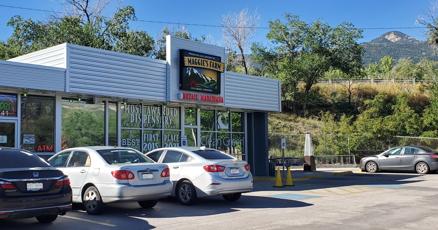[[{“value”:”
The city of Manitou Springs is taking steps to lower its retail marijuana sales tax from 10% to 5% in a bid to retain competitiveness with newly allowed recreational sales in Colorado Springs.
The change would bring Manitou Springs’ retail marijuana sales tax in line with Colorado Springs. Manitou Springs Mayor John Graham said a drop in the marijuana revenue would make a big difference to the town.
“It’s a significant amount of our budget, and any decline in that means we have to tighten our belt,” he said.
The measure passed on first reading with the City Council Tuesday, with a public hearing scheduled for June 3.
Bill Conkling, founder and CEO of retail marijuana shop Maggie’s Farm, one of two dispensaries in the city, said profits were declining significantly in the wake of a successful ballot measure this past fall allowing existing medical marijuana businesses to transition to recreational sales in Colorado Springs.
Colorado Springs licensing data shows 45 retail marijuana licenses listed in the city as of May 19.
Since recreational sales started in the state’s second-largest city the middle of April, Conkling told Manitou Springs council members that comparison sales numbers between last year and now were down about 30% week over week.
“You can imagine what that’s done to our profit margin,” he said.
A contributing factor, he said, was the impression among customers that prices would be higher in Manitou Springs due to higher taxes. The difference was noted in online chatter, Conkling said, though he said prices remained competitive with Colorado Springs.
“The optics have been really hard for us to mitigate,” he said.
Manitou Springs enjoyed a major spike in sales tax revenue after the city allowed marijuana sales in 2014. State law does not allow the city to disclose specific numbers when it comes to sales revenue when there are fewer than three marijuana stores, but overall sales tax revenue surpassed the city’s decade high-water mark in the year marijuana sales began.
Sales tax revenue in the “other” category of industry, including marijuana shops, increased 4,268% in the first half of 2015 compared to the same period in 2014 before sales began, according to city financial data.
In the intervening years, Manitou Springs has been aware of the possible financial effect of a successful recreational marijuana ballot measure in Colorado Springs.
In August 2022, the city stopped funneling revenue from recreational sales into the Manitou Springs Urban Renewal Authority in anticipation of a Colorado Springs ballot measure. The money instead went to the town’s general fund after a narrow 4-3 vote from City Council.
Earlier the same year, the city increased its sales tax percentage from 6% to 10%. Graham said the change was prompted by multiple financial burdens on the city, including the cost of a new ambulance service and water treatment plant maintenance.
“I think we were pretty petrified at all the expenses,” he said.
Three years later, he said Manitou Springs continues to rely on sales tax revenue for completing deferred maintenance on the city’s aging water and sewage system and for the process of burying utility lines.
“The appetite and the need for capital improvement money is pretty significant,” he said.
According to city financial records, Manitou Springs collected about $32 million in sales tax revenue from its “other” category in the year to date accounting from December 2024, which was the second largest category behind $37 million from “Shops-Gift, etc.”
”}]] The city of Manitou Springs is taking steps to lower its retail marijuana sales tax from 10% to 5% in a bid to retain competitiveness with newly allowed recreational sales in Colorado Springs. Read More


